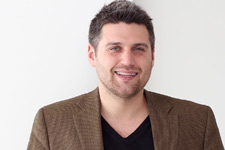Program helped retrain brain, refocus life
By Christopher Clark

Adam Rice knew precisely why he wanted to return to school, nearly a decade after his undergraduate years at Huron University College.
“I wanted to retrain my brain. I thought there was no better way to do that than by being in school and using my head.”
Rice, 32, is speaking quite literally. After a brain injury, caused by years of drug and alcohol addiction and abuse, he hit the lowest of several low points in 2012. He had a tonic-clonic seizure while standing outside the Apple Store in London’s Masonville Place. A second seizure left him with blood on his brain. He doesn’t remember the two weeks of treatment that followed.
But he does remember the six weeks he spent confined in the London Health Sciences psychiatric ward, which led to a 12-step program and, at last, sobriety.
“I was in the recovery program, and it was really good, but I felt like this time around there had to be something more – something to be positive about and give me hope. I decided to go back to school. Enrolling at Western turned out to be my brain rehab program.”
In September 2014, Rice was one of about three dozen students in the inaugural Graduate Diploma in Professional Communication and Management (GDip) class. The program is a two-semester bridge from any undergraduate degree to a career. The eight months Rice spent earning his diploma was a crucial transition for him, as he put his addictions behind him and created a start-up financial technology company.
At first, he found the lectures challenging. “I would zone out sometimes and battle my concentration. But after a little while, I could feel my brain starting to function better. It was an amazing feeling.”
Rice was open with his classmates about the challenges he faced being back in school. He recounted how he’d moved to China after three years studying at Huron and completed his degree at the University of Hong Kong.
He told them how he started a real estate aggregating business in China with a German partner. And he told them about the day in 2011 when his motorcycle collided with a car and he nearly died.
He needed O negative blood, something the hospital in remote Southern China did not have. It was three hours away.
“I didn’t have three hours,” Rice said. “I remember lying on the gurney and calling my mom, saying, ‘Sorry mom, I’m not sure I’m going to make it.’ They decided to filter the O positive blood they had because it was the only option. But they knew it would make me sick – and it did.”
The surgery to remove his spleen and repair numerous internal injuries was successful but left him with muscle and nerve damage that would haunt him for years.
“My dad flew over right away and was there with me for about two weeks. The pain was bad, like my stomach was on fire. That’s when I started taking Oxycontin, to manage the pain.”
As much as he needed it, he might have turned down the powerful pain killer if he’d known how dependent he would become. That dependence would nearly kill him more than once in the following months.
When he was well enough to fly, he returned to London. For the next two years, his life was a series of extended treatment stops and often daily sessions with psychiatrists and other health professionals, in an effort to break his addictions.
Nothing worked. He was living a double life with his fiancé, changing out of his suit and tie, at lunch, into sweatpants and hoodie to buy Oxycontin before changing back and returning to his job for the afternoon. He added valium, cocaine and alcohol to the mix at various times.
It wasn’t until seizures nearly killed him that he found a way back. For three months, he attended two 12-step meetings every day. He still goes at least twice a week and relies on an anonymous sponsor to help keep him on track.
When he graduated from the GDip program in the spring of 2015, he founded LoanConnect, a financial technology company that aggregates lenders across the country into one easy-to-use site for borrowers. The parent company is Asset Direct of Canada, and Rice now has two partners and four employees. They are working on a point-of-sale loan app that will allow people to finance large purchases with an instant loan at rates well below credit cards.
Rice spent the summer 2016 in the Propel Entrepreneurship business incubator program at Western and then moved to office space provided by Goodwill at its London headquarters.
He also built on his GDip by earning an MBA from an Australian school that specializes in distance learning. (His exams in that program were proctored at Western.) He earned his degree in January.
In March, the FinTech Club, at Ivey’s Scotiabank Digital Banking Lab, brought together 65 teams to examine a case study about Asset Direct and make recommendations about how the company can grow and thrive.
“That was an amazing day. There were some really cool thoughts about things we can do, including using artificial intelligence,” Rice said. “We’re just working through everything we learned that day.”
However successful the business turns out to be, his greatest accomplishment is simply being alive and healthy. Much of his post-treatment success is rooted at Western, most importantly the way his eight months in the GDip program helped him recover from brain injury and get on with life, Rice said.
